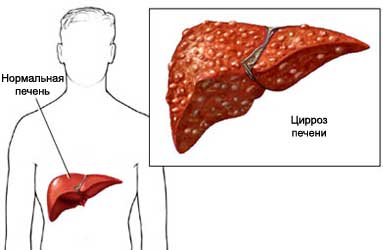Liver cancer
Description of liver cancer
The liver is located on the right side of the abdomen. It stores and metabolizes nutrients, and filters the blood. Liver cancer – the appearance and development of cancer cells in the liver.
Cancer there, when the body's cells start to randomly share. The result is a mass of tissue, called a growth or tumor. The term cancer refers to malignant tumors, that can invade nearby tissues and spread to other parts of the body.
Causes of liver cancer
Causes of liver cancer are not known. However, studies show, that there are certain risk factors, Related Disease.
Risk factors for liver cancer
Factors, which increases the risk of liver cancer:
- Paul: male;
- Age: 40 and older;
- Infection with the hepatitis B virus and hepatitis C virus;
- The formation of scar tissue in the liver (cirrhosis);
- Excessive alcohol consumption;
- Malnutrition;
- Obesity;
- Exposure to an infectious agent;
- Gemoxromatoz (abnormal accumulation of iron in the tissues of the body);
- Hereditary metabolic diseases, such as alpha-antitrypsin deficiency (JSC) and tyrosinemia;
- Exposure to certain chemicals:
- Aflatoxin – substance, vыrabatыvaemoe fungus, which often affects wheat, peanuts, soybeans, corn and rice in tropical and subtropical regions;
- Vinyl chloride and thorium dvuokisy;
- Anabolic steroid – male hormones. Sometimes prescribed for medical reasons, and taken by athletes to increase strength and endurance;
- Arsenic poisoning.

Symptoms of liver cancer
Symptoms of liver cancer in its early stages is uncertain, and often go unnoticed.
Liver cancer can cause the following symptoms:
- Loss of appetite;
- Unexplained weight loss;
- Fever;
- Fatigue;
- Weakness;
- Abdominal pain;
- Razdutыy life;
- Nausea;
- Dark urine;
- Excessive itching of the skin;
- Confusion and increased sleepiness;
- Yellowing of the skin and / or whites of the eyes.
These symptoms, except for liver cancer, They may be caused by other, less serious diseases. If you experience any of them, consult a doctor.
Diagnosis of liver cancer
The doctor will ask about your symptoms and medical history, and perform a physical examination.
Tests may include:
- Blood tests – to determine, how well the liver or substances found in the blood, that indicate the presence of liver cancer;
- Chest X-ray and life;
- Angiogramma – X-rays of blood vessels;
- CT scan (CT) – type of X-ray, which uses computer, to make pictures of the liver;
- Magnetic resonance imaging (MRT) – this is a test, which uses magnetic waves, to make pictures of the liver;
- Laparoscopy – a thin tube inserted through a small incision in the abdominal cavity, to carry out inspection of the liver;
- Biopsy roasted – removal of a sample of liver tissue to test for cancer cells.
Treatment of liver cancer
After detecting liver cancer survey is conducted, allowing to determine the extent and scope of cancer. Surgery is the only curative procedure in cancer of the liver. Chemotherapy and radiation therapy can reduce symptoms, associated with cancer, but they do not cure the disease.
- Operation – removal of a cancerous tumor and nearby tissue, and, perhaps, neighboring lymph nodes;
- Krioxirurgija – It destroys a tumor by freezing its metal probe;
- Ethanol ablation- – It kills cancer cells by administration directly into the tumor alcohol;
- Radiation therapy – Use of radiation, to kill cancer cells and shrink tumors. Therapy can be:
- External radiation therapy – radiation is directed at the liver from sources outside the body;
- Internal radiation therapy – the radiation source is placed as close as possible to the cancer cells. Radiation granules or compounds are delivered directly into the tumor through a special catheter, which is in the hepatic artery, blood vessel, which brings blood to the liver;
- Radiofrequency ablation – The use of heat, to destroy the tumor. To help the doctor to send a probe to the tumor, used medical imaging techniques;
- Chemotherapy – the use of drugs to kill cancer cells. Preparations for the chemotherapy may be given in various forms: tablets, injection, the introduction of a catheter. The drugs enter the bloodstream and spread throughout the body, killing mostly cancer, and also some healthy cells.
- Sorafenib (Nexavar) – a new drug target for therapy, which is used to treat liver cancer. In one study, an overall survival increased from 7,9 months before 10,7 months;
- Biological Therapy – the use of drugs or substances, produced by the body, that allows you to increase or restore the body's natural defenses against cancer.
Prevention of liver cancer
To reduce the risk of liver cancer:
- If you are using a syringe for injecting drugs, Always use clean needles;
- Use condoms during sexual intercourse, If you or your partner are not in a monogamous relationship, or if you are not sure, that your partner is not a hepatitis.
- Children need to be vaccinated against hepatitis B.
